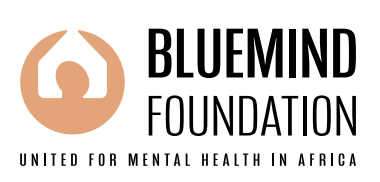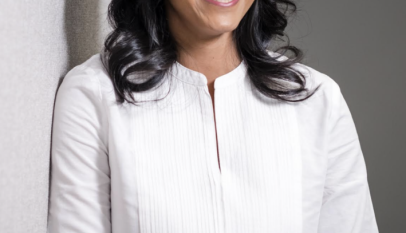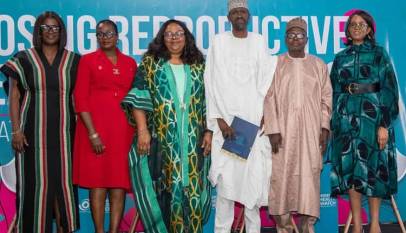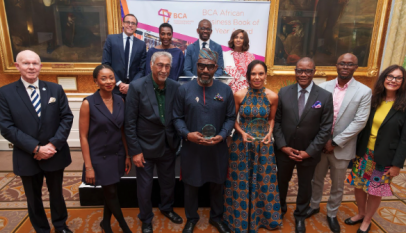When Mercy Corps Nigeria commemorated 2020 Menstrual Hygiene Day amidst COVID-19
In commemoration of the Menstrual Hygiene Day 2020, Mercy Corps Nigeria hosted a webinar discussion with stakeholders from government, NGOs, United Nations and the media in Nigeria, which focused on key issues around period poverty and the need to make pads free for all women and girls.
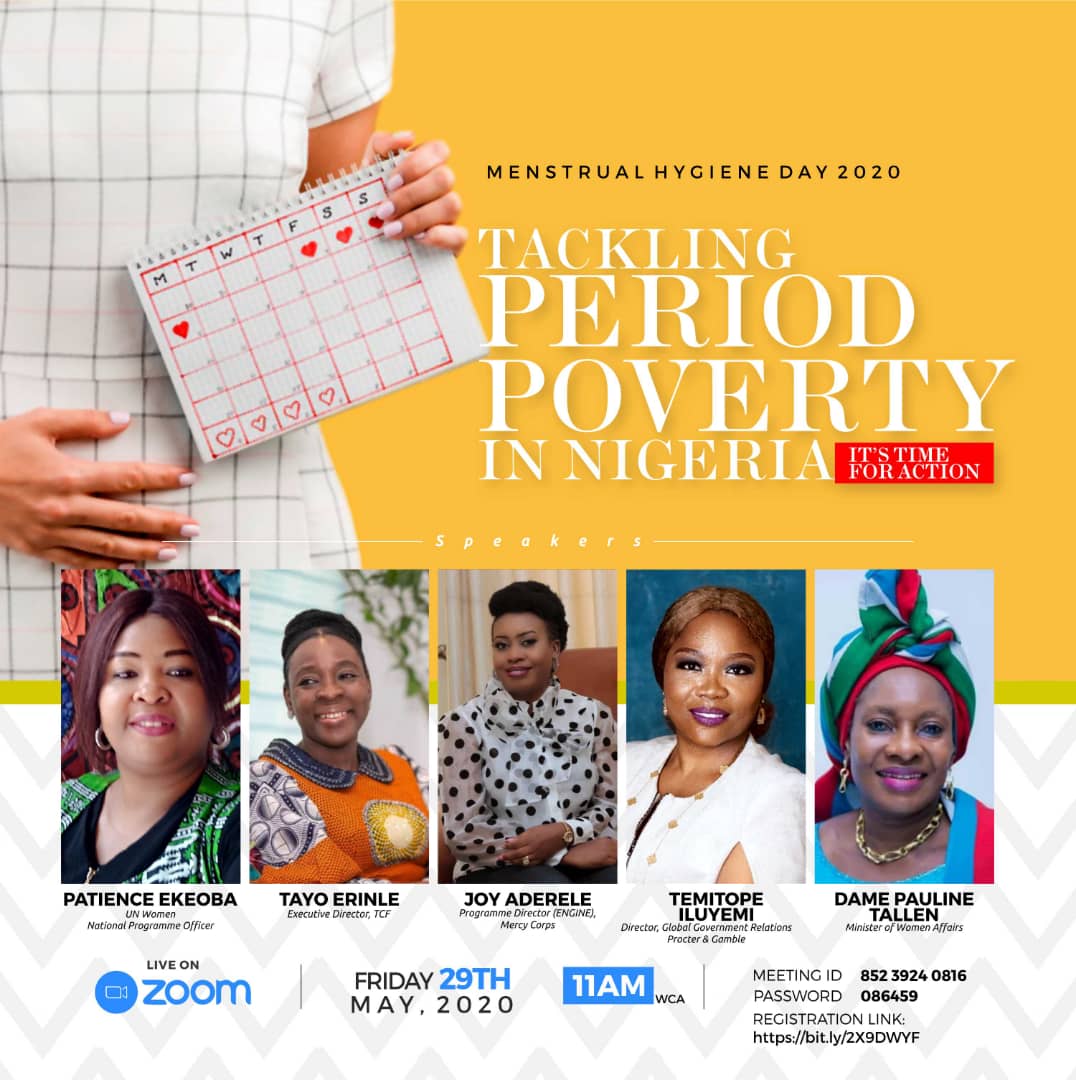
Menstruation is an integral part of the life of women and girls however, the monthly menstrual flow is a nightmare for the over 1.2 billion women across the world who do not have access to basic sanitation during their periods. In Africa, one in ten girls miss school during their periods, according to an estimate of the United Nations Children’s Fund (UNICEF). This means many of the girls eventually drop out of school.
Thus, there are several advocacy campaigns focused on making pads free targeted at the government, private sector and the general public. In addition, the Menstrual Hygiene Day (MH Day) is commemorated every year on 28 May as a global advocacy day that bring together non-profits, government agencies, the private sector and the media to promote good menstrual hygiene management (MHM) for all women and girls.
Since its first celebration in 2014, the MH Day has been helping to break the silence, raise awareness and change negative social norms around MHM as well as increasing engagement with decision-makers on the importance of increased political priority so as to catalyse action for MHM, at global, national and local levels. In commemoration of the MH Day 2020, the nonprofit Mercy Corps hosted a webinar discussion with stakeholders from government, NGOs, United Nations and the media in Nigeria which focused on key issues around period poverty and the need to make pads free for all women and girls.
Themed: “Tackling Period Poverty in Nigeria: It’s Time for Action!” the commemoration was part of the second phase of Mercy Corps’ Educating Nigerian Girls in New Enterprises (ENGINE II) programme, focused on ensuring in-school girls successfully transition to the next phase of their education while out-school girls have the opportunity to build their functional literacy and numeracy skills, amongst other goals. ENGINE II is funded by the UK Department for International Development (DFID) through its Girls Education Challenge (GEC) Fund.
In his opening remarks, deputy country director of Mercy Corps Nigeria, Ram Kisham, said his organization had since 2012 been working with boys and girls in Nigeria, as part of its Africa regional policy of working with young African leaders. He added that in Nigeria, as well as its work with young people, Mercy Corps was working around three other thematic areas namely, peace, conflict and reconstruction; humanitarian and recovery efforts; market systems and private sector engagement.
“Menstrual hygiene is an area we work on from education and health perspective. It is very important. If health issues such as menstrual hygiene are not addressed they lead to social and psychosocial issues. All stakeholders in the family, community and NGOs need to work together; we will make sure the Menstrual Hygiene Day is central to our work with girls in the future,” said Kisham.
Patience Ekeoba of UN Women said the MH Day was an opportunity to reflect on progress made towards giving women a life of dignity adding that UN Women provides a lot of operational support to countries including Nigeria aimed at ensuring women and girls lived a life of dignity, by working with NGOs and private sector to mainstream international laws and standards into local laws. She described period poverty as a huge a problem in Nigeria, where many people live on less than one USD per day and a pack of sanitary pad also costs roughly the same amount.
Ekeoba adds that Nigerian women’s state of poverty was but a result of patriarchy, unequal power relations between men and women; unequal distribution of resources as well as lack of prioritization of women’s issues.
“Women are being excluded from access to resources, power and governance cycles. A lot of women don’t have access to education which perpetuate the cycle of poverty among them. Issues concerning women and girls are not being taken seriously including menstrual hygiene which is not seen as an important issue. There is an obvious lack of prioritization of women and girls hence the absence of separate toilets for girls in schools which affect them during menstruation and also affect their overall attendance in school,” she said.
Ekeoba noted that the COVID-19 pandemic had further deepened existing inequalities in the Nigerian society which meant many women and girls could no longer afford or access sanitary pad, adding that in the pandemic situation, the priority of most women was not sanitary pads instead it was feeding. She describes lack of Water, Sanitation and Hygiene (WASH) facilities in schools and communities as a major challenge for girls during menstruation.“Girls accessing free pad can no longer access it because the schools where the pads are being distributed to them had been shut down, ” she said.
Temitope Iluyemi is director of global government relations for Africa at Procter & Gamble (P & G) Company which partners Mercy Corps to distribute sanitary wares to Nigerian schoolgirls. In her remarks, Iluyemi said P & G was committed to ending period poverty by ensuring every girl had protection during menstruation adding their mission was to eliminate barriers to girls’ education and empowerment including lack of period protection. “We initiate conversations leading to change by engaging policymakers on supporting policies that will end period poverty,” she said.
Tayo Erinle is the executive director of the Tabitha Cumi Foundation (TCF), a nonprofit partner of Mercy Corps Nigeria under the ENGINE programme which has worked with over 5000 girls in the Federal Capital Territory (FCT) on promoting safe spaces for girls.
She decried the fact that most COVID-19 palliative support by governments does not include sanitary wares as well as the high-level of silence, myths and taboos around menstrual hygiene in Nigeria. Consequently, she said, many girls never knew anything about menstrual hygiene until they began experiencing menstrual flow themselves advising on the importance of puberty training for girls in schools.
“Therefore, girls are told all sorts of stories about menstruation by their peers including that the pains they are experiencing during period will ease if they get disvirgined. Menstruation is burdensome, many girls abscond from school for five days every month due to menstrual cycle because they can’t afford sanitary pads. It’s a shameful experience,” she said.
While speaking about her nonprofit’s programme tagged Always Keeping Girls in School (AKGIS), implemented across 29 schools in the FCT and which ensures girls always had access to sanitary pads while in school as well as providing guidance and counseling support for both girls and boys on menstruation. Subsequently, she said, the girls were now able to come to school every day while the boys had become champions of menstrual hygiene who would not mock girls undergoing menstruation anymore, but would instead support them.


